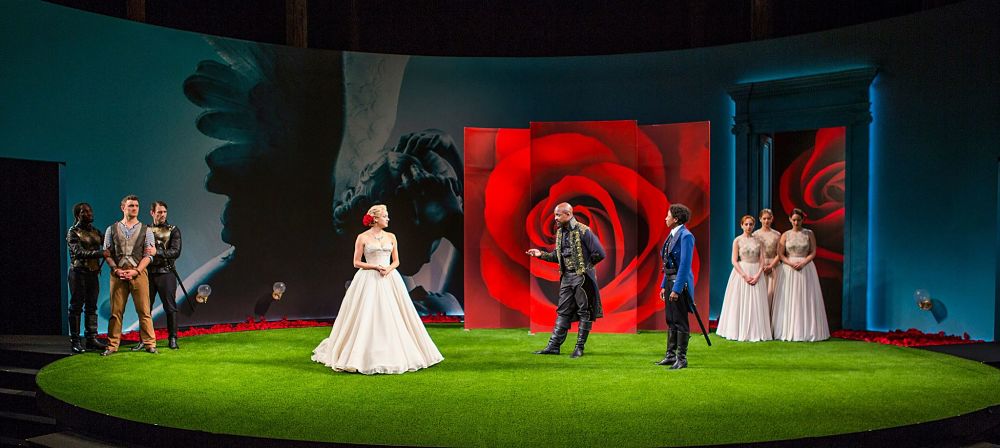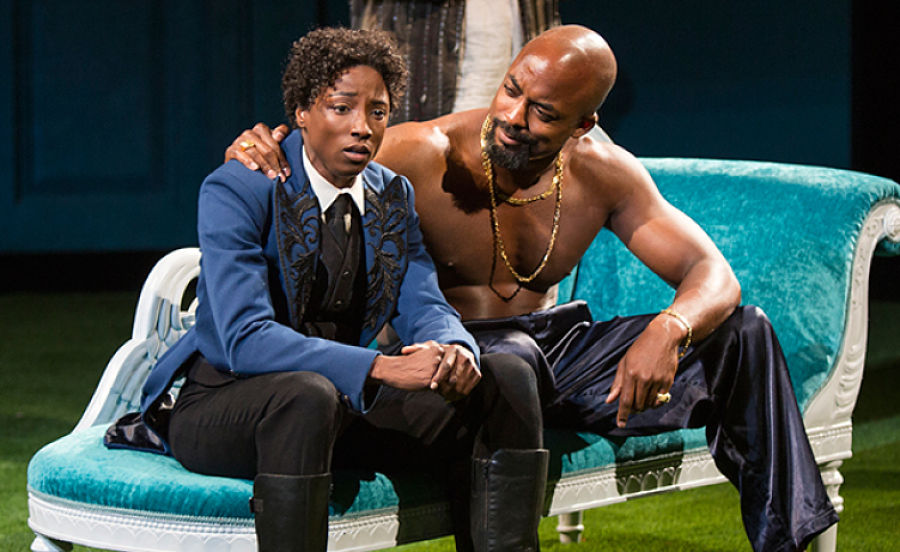SAN DIEGO, CALIF.: On the Friday the U.S. Supreme Court released its landmark decision that legalized same-sex marriage nationwide, Rutina Wesley was having a gender-bending moment of her own. She was taking the stage that night as Viola in Shakespeare’s Twelfth Night at the Old Globe, in the role of a woman pretending to be a man, and stirring a certain amount of (confused) same-sex desire as a result.
Of course, Shakespeare could have had no inkling of today’s sexual politics when he wrote the play in 1601. But the apposite timing isn’t lost on Wesley.
“There’s just a lot of stuff in this play that is very timely to where we are today,” she said. “There’s homosexuality. This is a long time ago that he wrote it, but it’s still very present today in our everyday lives and how we look at each other, how we fall in love, and who we fall in love with.”
Wesley comes to Twelfth Night after seven seasons playing Tara Thornton in the vampire drama “True Blood” on HBO. She appeared on Broadway in David Hare’s The Vertical Hour, and Off Broadway at Rattlestick Playwrights Theater, MCC Theater, and the Public Theater. Twelfth Night, directed by Rebecca Taichman and running until July 26, marks her first professional foray into Shakespeare. Below, Wesley explains how doing the Bard is harder than killing vampires on TV.

When were you first exposed to Twelfth Night?
In my first year at Juilliard, it was the fourth years final production. I’ll never forget it: The fool hung himself at the end from the rafters. It was very disturbing. Twelfth Night has so many facets of life in it and so many emotional attachments that one could sort of recognize in one’s own life. I love that Shakespeare called it Twelfth Night, or What You Will. Whatever you’re going to take from it, you’re going to take. Some people will love our take on it, and other people may not like it. But I hope that everyone walks away and has a dialogue about love, about relationships, about sexuality.
Gender, as well, since it’s a seminal gender-bending play.
Exactly, the role reversal—I love that. Viola gets to inhabit a man and she’s just as good as the next guy! She’s just as witty, she’s a survivor. And it’s one of the most challenging roles that I’ve ever had to play.
More than killing vampires?
[laughs] “True Blood” was great and I did some great stuff on there. But no one’s ever seen me do this. I’ve done some comedy but it was not like this. I can have my clown come out, which is a lot of fun. And I get to be an ingenue, and I wasn’t that on “True Blood” at all. I just did “Hannibal,” and I thought that was the hardest role, playing this incredibly strong blind woman. But I think Viola to date is the hardest role I’ve ever had to play. Playing a person who’s playing another person.
Whom another woman falls in love with.
Yeah! That’s what I love playing around with. This idea of falling in love with the essence of a person—their personality, their spirit. Olivia falls in love with Cesario as he is. She thinks he’s a man, but that aside, she falls in love with a person, with their essence.
The same with Orsino and Cesario. There’s that weird thing there—like, Oh, wait a minute, I think I may be falling in love with this boy! How do you express yourself to someone when you can’t really say, “I’m in love with you”? It becomes, “Here’s my purse. Take my money and go buy something nice!” Or it is requited, but that person can’t actually live that life because of some other reason? Some people feel like they can’t live in their own skin either because they’re gay or it’s a racial thing or what have you. It’s very interesting in this play to see someone fight that.

I noticed that you acted opposite Fiona Shaw quite a bit during your time on “True Blood.”
Oh my gosh! Talk about floating! I’m in love with her. She’s the most…I have no words. She’s a beast. Her talent is undeniable. She just made me feel so comfortable. It was never, Oh my God, it’s Fiona Shaw; I just had to be on top of my game with her. And it pushed me to want to be better and to try to come close to matching her. Which is impossible, because she’s just so amazing! She gave me confidence that I didn’t know I had and I will be forever indebted to her for instilling that in me and knowing that I can do anything. I can do any role that I want to do if I just put my mind to it and not let anything stop me.
Do you have any phobias?
I’m really deathly afraid of heights. I will get on a roller coaster, but I will scream bloody murder and you will think that I’m probably gonna have a heart attack.
If you weren’t an actor, what would you be?
I would be dancing. My dream would be to dance in the Alvin Ailey Dance Company. That was my dream when I was younger; I was a dancer first. I would have loved to be dancing somewhere, twilling around. Either en pointe or barefoot—that was my big, big, big dream.
What’s been your greatest challenge?
Well, if I’m going to be completely honest with you, being a dark-skinned African-American actress. For me it’s challenging because there’s not a lot of roles out there for me. I have to be proactive in my career. I go after the crossover roles.
I have to make opportunities for myself. I have to walk through a door and really hope to change people’s outlook on me. Because people have watched me play Tara on “True Blood” for seven years, you can get checked into a box as one thing. Whenever I have an audition, I try to switch myself up, whether it be my hair or something else, so they think, “Oh, she’s not this one thing.”
That’s so interesting that you brought that up, because you don’t see many Violas of color.
I was thinking about that, too! Not that people do it on purpose, but I don’t think that’s done a lot. But I’m in the school of, you find the actress or actor that you want for that part. It shouldn’t matter what they look like. Unless it’s specific for the play, unless you’re doing August Wilson. For Shakespeare, these characters represent mankind, so they can be anything. That’s what I love about Shakespeare—it’s universal, you can criss-cross and do all kinds of stuff. I wish we would do that more in modern television and in film.


